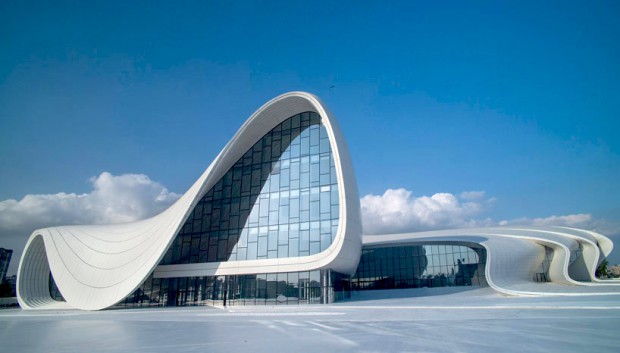Is good design more important than bad politics? The London Design Museum just awarded their Design of the Year award to Zaha Hadid for her Heydar Aliyev Center, a multi-purpose cultural center in Baku, Azerbaijan. Jurors discussed the building with no small praise: “It’s beautiful, it’s inspiring, it’s the clear vision of a singular genius and we thought it was a remarkable piece of work,” said jury chair Ekow Eshun. Another juror put it more bluntly (and grossly): “It is as pure and sexy as Marilyn’s blown skirt.” Sexy or not, that doesn’t absolve the center from being directly embroiled in a larger human rights controversy: a series of forced evictions in Azerbaijan’s capital.
According to The Guardian, nearly 250 homes were cleared for Hadid’s building. Human Rights Watch reports that Azerbaijan has illegally taken hundreds of homes in the capital to make way for urban development—both forcibly evicting individuals from their homes and inadequately compensating them. The Guardian noted that Hadid’s firm said the contractor they used for the Heydar Aliyev Center was “internationally accredited by the Geneva-based inspection and verification body SGS.” However, it’s unclear whether that statement was a direct response to the allegations of forcible eviction. Otherwise, Hadid has yet to comment on the issue.
The center itself is dedicated to the controversial Heydar Aliyev, who was a member of the KGB before becoming president of Azerbaijan after the fall of the Soviet Union. Aliyev was known for establishing a cult of personality amidst a corrupt political regime. Though Aliyev died in 2003, corruption extends to this day: His son, Ilham Aliyev, succeeded his father as president, and has been accused of arresting political activists and orchestrating questionable elections. By building a center dedicated to this highly problematic regime, Hadid only reinforces the culture that allows for its continued rule.
This isn’t even the first time that Hadid has come under fire for working with ethically questionable governments. Earlier this year, The Guardian reported that more than 500 Indian migrant workers had died while doing construction work related to the 2022 Qatar World Cup, for which Hadid designed the stadium. When questioned, Hadid essentially sidestepped the issue, claiming that she, as an architect, has no responsibility for the actual construction of her buildings: “I have nothing to do with the workers. I think that’s an issue the government—if there’s a problem—should pick up.”
Aesthetic achievements though they may be, Hadid’s buildings have a real, negative impact on those who work to construct them and those who live around them. By failing to speak out against the political conditions that allow the World Cup Stadium and the Heydar Aliyev Center to be built, Hadid is ignoring her own complicity in perpetuating those errors.



Comments on this entry are closed.